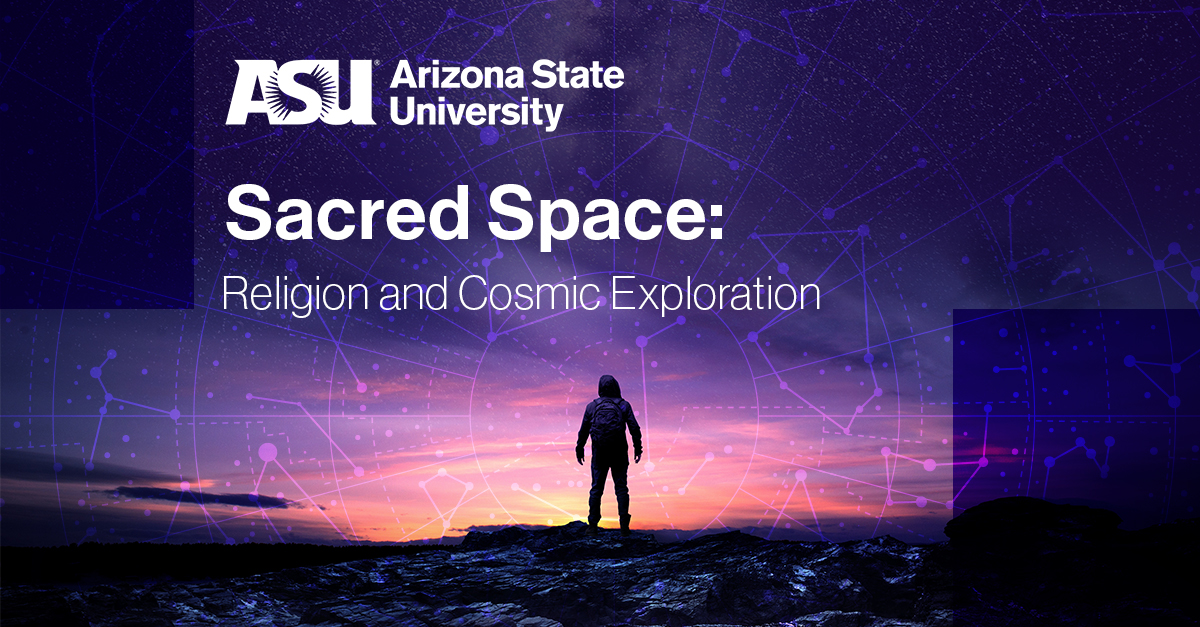Sacred Space: Religion and Cosmic Exploration symposium- How has religion influenced space exploration?

Event description
What does religion have to do with space exploration?
Quite a lot, actually. In fact, the histories, ideologies, representations and practices of religion are central to the project of imagining and building human space futures. As we venture into space, we will bring religion and religious ideas with us, knowingly or not.
Sacred Space: Religion and Cosmic Exploration is a series of public talks where diverse guests from the space sector and from religious traditions will discuss religion and space exploration — two topics that have been intertwined through human history.
Religion and space exploration have always been in conversation. We’re just making that conversation public.
All sessions moderated by Lance Gharavi & Mary-Jane Rubenstein.
Session 1
How has religion influenced space exploration?
March 2, 7 p.m.–8:15 p.m. ET
Most people know that NASA missions tend to be named after Greek gods and goddesses. But did you know that the crew of the Apollo 8 mission—the first crewed mission to leave low Earth orbit—read from the biblical Book of Genesis as they orbited the moon? In this webinar, we talk with Roger D. Launius and Victoria Smolkin about the deep historical connections between religion and space exploration in the U.S. and Soviet/Russian space programs.
Panelists:
Roger D. Launius is former chief historian of the National Aeronautics and Space Administration and most recently Associate Director for Collections and Curatorial Affairs at the Smithsonian Institution’s National Air and Space Museum. He is the author, most recently, of The Smithsonian History of Space Exploration: From the Ancient World to the Extraterrestrial Future (Smithsonian Books, 2018); Apollo's Legacy: The Space Race in Perspective (Smithsonian Books, 2019) and Reaching for the Moon: A Short History of Space Race (Yale University Press, 2019). He is also a recipient of the NASA Exceptional Service Medal and the Exceptional Achievement Medal. He has been a guest commentator on space history for all the major television and news radio networks.
Victoria Smolkin is Associate Professor of History and Russian, East European and Eurasian Studies at Wesleyan University. She is the author of A Sacred Space Is Never Empty: A History of Soviet Atheism (Princeton University Press, 2018), which was awarded Honorable Mention of the Wayne S. Vucinich Book. Her writing has also appeared in the Los Angeles Review of Books, The Washington Post and Politico, among others. She is currently at work on two projects: “The Wall of Memory: Ukraine and the Impossibility of History,” and "The World of Tomorrow: Communism, Cosmism and the Fate of Utopia."
Moderators:
Lance Gharavi is professor of Theatre at Arizona State University and Associate Director of ASU’s Interplanetary Initiative. He is the author of Western Esotericism in Russian Silver Age Drama: Aleksandr Blok’s The Rose and the Cross and editor the anthology Religion, Theatre and Performance: Acts of Faith. His work focuses on points of intersection between performance, technology, science and religion. He specializes in leading transdisciplinary teams of artists, scientists, designers and engineers to create compelling experiences and advance research. He led the creation of Port of Mars, a game-based platform for social science experiments and is currently working on a new project about consciousness.
Mary-Jane Rubenstein is the author of Astrotopia: The Dangerous Religion of the Corporate Space Race (2022), as well as numerous other books on the intersections of science, philosophy and religion. Her book Worlds Without End: The Many Lives of the Multiverse(2014) won the 2022 Iris Award for “outstanding work at the intersection of science, religion and technology.” Rubenstein teaches Religion and Science in Society at Wesleyan University, where she is also affiliated with Philosophy, and Feminist, Gender and Sexuality Studies.

